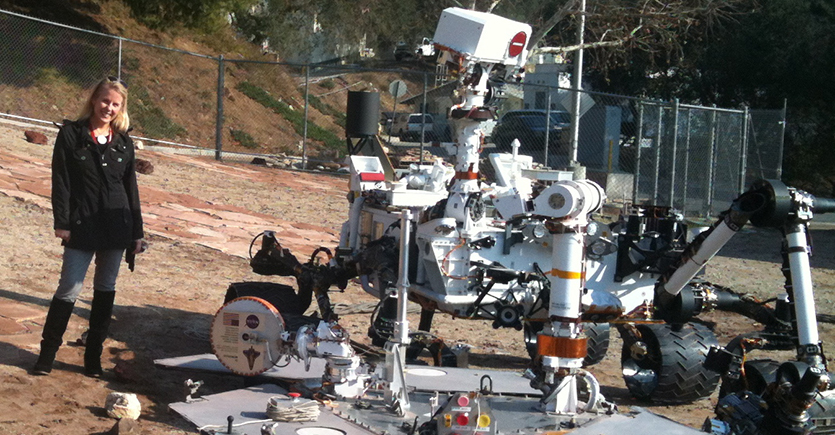
Ann Devereaux
Flight System Engineer - NASA's Jet Propulsion Laboratory.
I was born in Providence, Rhode Island, but grew up in Rockledge, Florida. Rockledge is right in the shadow of the Kennedy Space Center (KSC).
I was one of those kids who would put a lounge chair out in their driveway to sit up late and look at the stars through a cheap telescope. In Florida though, the bugs are VICIOUS, so it was a big commitment. I used to bundle up in layers of blankets and towels and such to where my eyes were only peeking out in order to protect myself from the bugs.
I have always loved the idea of space -- the vast unknown frontier. Growing up near KSC, many of my friends' parents worked for NASA. So, for me, working for NASA one day seemed like an attainable goal; that I could have a career in space exploration too.
However, the defining moment for me was when I was a high school senior: I was selected to intern at KSC through NASA SHARP (Summer High School Apprenticeship Research Program). I had a fantastic time, met friends who I am still close to after all these years and pretty much set my sights on a future career with NASA.
Also, during my sophomore year in college, I was the first in line to interview with NASA's Jet Propulsion Laboratory (JPL) for a summer job, which got my foot in the door -- I've been working here ever since.
I had a wonderful mentor, Mike Padgett, at KSC who was a major source of inspiration for me. Mike is an engineer and I was really impressed with his approach to composing and then solving problems. He has a great lab, and we would spend a lot of time tinkering with equipment in order to get whatever problem we were looking to solve right.
Turns out, problem solving and tinkering are two of my favorite things. I had always thought I might go into astronomy or some other science discipline, but working with Mike showed me what a real engineer does, and I knew that was what I wanted to do for my career.
I'm a flight system engineer, which is to say, I'm the lead system engineer for a flight system (i.e. a spacecraft).
In flight projects, system engineers are responsible for breaking down the desired functionality of a mission by figuring out what pieces are needed (sub-systems to do communications, to manage power, to do command and control of the spacecraft, etc.), as well as the performance needs of each part.
We work with the engineers building the subsystems to iron out any problems or unforeseen issues as they arise. When the engineers deliver their equipment, the system engineers are responsible for knitting everything together and validating the spacecraft's software: the "brain." This brain controls all the different parts that make up the spacecraft.
I had the amazing opportunity to be part of the landing team for the Mars Science Laboratory Curiosity rover. Nothing in my life can compare to that night when we saw Curiosity touchdown on Mars and send back her first pictures showing that she had made it. My goal is to someday surpass that moment with one of our new missions.
Don't be too focused on one goal. I think so much of what makes a person unique is all the serendipitous opportunities that they pursue; everything you do in your life adds to your own distinct perspective and your ability to judge new situations.
You do need a good basis in STEM (Science, Technology, Engineering, and Math) education so you can understand the fundamentals needed for space flight. However, the mark of a true engineer has a combination of creativity and practicality, which only comes from trying things out for yourself.
I still love to be outside, just like when I was a kid, so hiking and tennis are two favorite pastimes.
My engineer husband and I also love to tackle decidedly low-technology problems like raising chickens, curing our own olives, brewing beer, and cooking from scratch from our big garden. I'm very lucky that during the week I'm working with the most advanced technology for high-reliability missions in our solar system, but on weekends I bake bread using wild yeast harvested from the windowsill.
Don't mistake school for what your eventual work life will be. For example, I was always a terrible student in math -- I loved the concepts, but hated having to work through giant calculations. Science and engineering are both such rich disciplines that you can find a vocation which both drives your passion, but also matches the kind of work you like to do. School just gives you the foundation of knowledge so that we all have a common vocabulary. When you start your career, that's when you really develop the specific skills you'll need for the job you have to do.
Ann is featured in the documentary: Mission to Mars: A Horizon Special
Planetary science is a global profession.

